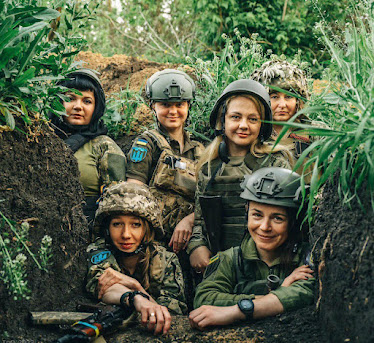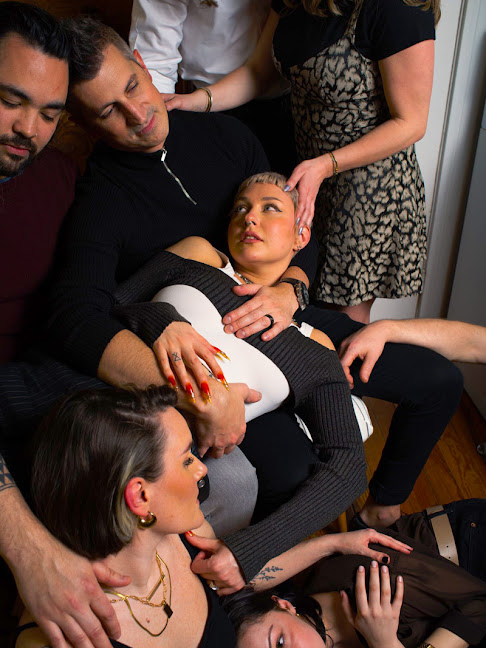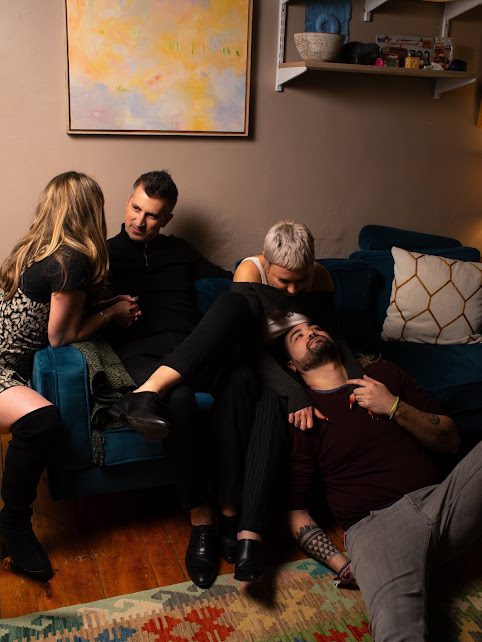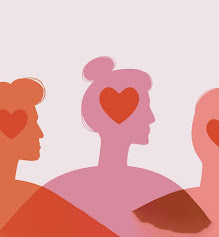A 20-person polycule have their say, at length, in the NY Times Magazine. For queer peeps "Is Monogamy Cool again?" And more.

|
|
Multilove amazement? |
How they set boundaries, navigate jealousy, wingman their spouses and foster community.
Interviews by Daniel BergnerPhotographs by Anne Vetter...It’s not clear when the word [polycule] was coined, but it seems to have started catching on around 15 years ago to suggest an intricate structure formed of people with overlapping deep attachments: romantic, sexual, sensual, platonic. It’s difficult to describe a polycule. Words like “family” and “network” are used, but neither on its own captures it. Perhaps it’s best left to a polycule itself to offer descriptions. ...These photographs were taken at a gathering of the polycule in Cambridge, Mass., in March. Some people pictured or interviewed asked that they not be identified and are using a middle name or a nickname.Describing the PolyculeKatie: The polycule is like this weird family.Ann: It’s chosen family. It works like complex kinship networks work — just a little kinkier. It reflects radical queer values.Katie: Our polycule is large, 20 or a little more — people in their mid-20s to mid-40s. There are self-identified males who identify as heteroflexible, heterosexual, bisexual. There’s a nonbinary person. Every femme-presenting person or woman identifies as queer. A lot of people are married and have primary partnerships. They’re coming to it from the opening of a monogamous relationship.
Ashley: A bunch of couples met in the summer of 2020. Over the next year, we were all dating and developing friendships with several couples and individuals that eventually blossomed into this community. It’s an evolving organism that looks entirely different from everyone’s perspective.
...Nico: Our polycule is female-run. It’s the female-identified people who spearhead. We convene, we plan, we call the shots. It’s a bunch of queer women who say we’re not going to follow the rules.Katie: It’s freedom. I am so grateful to be a part of it. I have this abundance of love to give. I feel so in my power. We all approach ENM, ethical nonmonogamy, differently. Everyone is so deeply in love with each other, whether or not it’s romantic love.Relationships With More Than One Person...M: (Katie’s main partner) I identified as a single guy. I went from that to dating nonmonogamously. And I fell in love with someone who was already in love with more than one other person. The fear of abandonment that I’d been programmed from Day 1 to expect, I had a huge amount of stress about that. And of expressing too much anxiety. I spent a lot of time suffering alone during the first months because I didn’t want to overwhelm my new partner and have them realize, Hey, you know what, this is just too much of a pain in the ass, and I need you to do more work to reach the level where you need to be....Ann: I’m 34, and I feel like I’ve been on and off nonmonogamous much of my life, even though I didn’t have the word. When I was 17, 18, I said free love. Around 2018, 2019, I swore off monogamy forevermore. I use the word “polyamorous,” though relationship anarchist is probably a more accurate representation.
My husband and I are very, very different, which is our strength. He’s a frat bro who loves sports, and I’m a radical alien witch academic nerd. In the beginning, we did all the typical stuff. Read the books on nonmonogamy, did the relationship check-ins. We’d sit down, take notes. We did every exercise in the books, listened to every podcast. We learned a strategy from the Multiamory podcast called “agile scrum,” which was adapted from business-meeting models. We utilized that format. We did that for a year and a half, at least once a month, sometimes six to 10 hours of hard poly-processing. That gave us great communication tactics.Robert: (Ann’s husband) We have this motto: Feelings are not facts. That gets us through the hard times. ... I would ask her questions, and she would be like, No, I don’t feel that way; and I would be like, I know you like being with him more than me; and she would say, I’m not lying to you, it’s different, but it doesn’t make me love you less, you provide so much more to my life than just sex. I totally get it now. That was the first instance of feelings are not facts. They feel like it. But they ain’t facts.
Setting Boundaries
Bine: ...We had discussed opening up our relationship to a potential third, because I identified as bi, and that was important to me. And then five years into our marriage, he was the one to start talking about ethical nonmonogamy. At that point we were saying, 'Let’s just have some fun, but ours is really the primary relationship.'There were a lot of restrictions. I felt very insecure, like if we’re going to do this there’s going to have to be a laundry list of rules. It can be a one-night stand, but we’re not going to see this person again. It can’t be a friend. But it became clear that these rules didn’t make any sense. We felt deeper connections with people beyond the sexual. We had to shift things, and we kind of drifted into the polyamorous space in 2018.Resources always help, books like “The Ethical Slut” and “Polysecure.” But undoing the monogamous script, the socialization, is really, really difficult.
Katie: There’s a lot of boundary-setting. Broken rules can be really damaging. Adhering to other people’s boundaries is a big part of being in the polycule. That’s paramount. In the polycule it ranges from people who really don’t have rules, to we’re only going to date people together, or we’re going to participate in the group only as friendships, or as sensual friendships, or we’re only going to be sexually intimate at gatherings, and outside of that we’re not going to date anyone individually. We keep track in group chats. We also gather as a group for parties that are sometimes intentionally sexual but sometimes not at all, and that is a time for people to communicate about their interests. But group chats are big.
‘‘It’s an evolving organism that looks entirely different from everyone’s perspective,’’ one person who is part of the polycule says.Making Time for Multiple Partners
M: The capacity to love is not a finite thing. But time is. You can’t do two things at once.Bine: Scheduling can be very tricky. Making sure there’s still one or two evenings every week when we spend quality time together. Overnights is something we’re discussing now. We don’t sleep over individually with anyone we’re dating; we only do that when we’re dating someone together.Ann: My husband, my nesting partner, is the person I own a home with. I also have life-partnership friends, I call them my wives, who are core members in the polycule. One of their husbands is one of my best friends and occasional sexual partner, and I do have sex with my wives, but we’re not romantically involved. But I love them.I don’t ask anyone’s permission on anything. I spend 60 percent of my time in my house with my nesting partner and about 25 percent of my time with another partner, and although I technically have one home right now, I’m in the process of building homes with multiple partners. There are check-ins, but the check-ins aren’t for permission. It’s, "I’m doing these things, I’m going to be gone for these two weeks, what do you need from me?"Katie: Poly-saturation is different for different people. For me, the maximum seems to be three partners at once, especially because I gravitate toward long-term committed in-depth relationships. I mean romantic partners. We have play parties that are intended to be a sexual space but more of a casual connection, and I’m not only with my partners there.Benefits of the Polycule
Robert: We have a lot of compersion — being happy seeing your partner happy with one of their other partners — for each other. There are times when my wife will meet someone she knows I’ll be attracted to, and she’ll say, You have to meet my husband. She’ll wingman me. Or I’m talking to this guy, and I think, She would really like this guy. We do that for each other.Bine: There’s something that feels radical about it, that feels liberating, that really speaks to empowerment, especially for women or queer or nonbinary individuals. It’s loving people in a very unapologetic way, not conforming to norms. We know why monogamy is still the dominant structure. The patriarchy. The lack of rights women had. As a woman, and as a queer woman, being able to live my life as authentically as possible without needing my husband’s permission, that’s empowering.Nico: I was in a very bad car accident in the fall, and I felt so supported. I had 20 text messages from people in the polycule — this is the doctor I know, this is the lawyer I have, this is the physical therapist, so many resources.Ann: I have one partner now with three kids. He is transmasc, and he’s radical about the way he raises them. They’re radically home-schooled. They’re 17 and nonbinary, 6 and 5. They know everything in age-appropriate ways. They’ve seen their mommy undergo the transmasc experience, seen their mom become who they really are.I was up late last night with him in a hotel room, and the 17-year-old was in the room snoozing, so we just sat on the bathroom floor chatting about our relationship all night, and while that was happening my husband was texting to say, Oh, I got a last-minute match, so I’m going to meet this girl for a date. And then I get a text while we were still on the bathroom floor vibing, it was 4 in the morning, and he said, We had a great date, a great connection, she’s looking for friends with benefits, we had sex. And I was smiling. You know you’re really poly when you’re with one of your partners talking about how much you love each other and you’re so happy your husband had this awesome night. ...Katie: Last night I was at a party that was full of poly people, and at the end of the night we wound up in this big cuddle pile. There were eight of us fit together like puzzle pieces, snuggling. It felt so cozy, so much oxytocin flowing. We were all envisioning living together, not having to worry about individual mortgages, just having some big house. Can’t we just do that? Why can’t we do that? An adult sleepover camp, that’s the vibe. It is my mission to make that happen for me and whoever wants to join me.
Poly as an Identity or a Movement or BothAshley: Whenever you veer outside the confines of the status quo, it is political. We’re really intentional about the way we want to connect, really questioning why one type of relationship has to be more significant than others. For the first time in my life, I’ve found community, in a true sense. These are people who really show up for each other in beautiful ways, people who aren’t guarded around each other. It’s just pure love. I can’t imagine my life without it now.Ann: It is very much about social change. It is about making the world a better place. I want to be in relationships and be with people who make me live in this world better.Nico: Some of us are survivors of sexual assault and have reclaimed what it means to be a sexual woman, to be radically and unapologetically ourselves. Some don’t really ever have sex — I think there is a power in female sexuality that doesn’t necessarily mean having a lot of sex; I don’t know how to explain that. It’s about making decisions for yourself, how you want your relationships to look....What has been valuable is being around men who want to be around empowered women, who aren’t intimidated. It’s not like they’re wimpy guys — to me, they’re strong because they’re not threatened....Katie: I hope this is a social movement. I hope people will feel more freedom about how they want to live and about pooling resources and living their best life. The structure of the nuclear family, the nuclear marriage, needs to shift. It’s really hard to afford a house. Some of us are thinking of moving into a place with four or five bedrooms where eight or nine of us could live together. We could share the burden of bills. It’s just more realistic. And it would be a community space. We would hold events and gather and play and have this endless sleepover. If I get to do this, I will have achieved something great — great emotionally and great in terms of social transformation.
Q. In Greater Boston, there’s a lot of talk about polyamory — mostly because Somerville became the first municipality in the country to pass an ordinance where you can have more than one domestic partner. Now other communities [Cambridge, Arlington] are following suit. Is polyamory something that’s coming up more for you? Are people checking in to see how you feel about it?A. I wrote about consensual non-monogamy and polyamory in “The State of Affairs” and in “Mating in Captivity”... from the point of view of how it helps us reconcile the improbable duality between independence and belonging. It was one of the ways people were answering the question of “How do I straddle the need for security and the need for freedom?” ... But in addition, I think that polyamory, more and more, has become an answer to questions of community building. ... I’ve said before, the nuclear model is too insulated and isolated. We demand too much from one person to give us what the whole village is to provide. I’ve said before that gay couples have long understood the difference between emotional monogamy and sexual promiscuity — and they understood that monogamy is a primary commitment to a primary relationship that may or may not involve sexual exclusiveness. ... Polyamory is a philosophy. It’s a practice. It’s a relational arrangement. It’s not just a solution to the mishaps of infidelity. It needs to be done in a context that demands enormous equality. It can’t be a power maneuver.
...Just take it from Diana, 45, and Ed, 49, who’ve been polyamorous for 17 years. Like every couple, they experienced their own growing pains, but these two are happy, in love, and raising their eight-year-old daughter together. ...
Q: Your other legislative push is around family status non-discrimination. Why is this needed?A: Many neighborhoods are zoned for couples—even though, as we’ve discussed, the majority of Americans are doing something different. Some people are not getting houses rented to them if they want to live with, say, their best friend and kid and mother. A property owner can say, I was looking for a traditional couple. So, every time we pass one of these laws, we're able to raise awareness that 80% of us are doing something different and our laws need to reflect this reality. In fact, I encourage us to get away from saying “traditional” or “non-traditional” family because living in extended and multi-generational families and communities is what is traditional.Q: What about the argument that children need stability?A: Children absolutely need stability of parental figures, as numerous psychological studies have shown. But in the past, those researchers made the logical leap that stability needed to be a married mother and father. Now, we’re clearer that stability can also be mom and grandma, a same-sex couple, include a step parent, and beyond. These families can absolutely provide stability and children in them thrive.
On this episode: Elizabeth sits down with Jess Daylover and her metamour, Ash, of the Remodeled Love podcast, to talk all things polyamory and parenting. There are a lot of misconceptions out there about what polyamory is and isn’t — so we think you’ll love hearing about how it works as a parenting co-op.
I haven’t been monogamous since high school, and even then, my relationships were never fully closed. So when I learned about polyamory at 22, I was thrilled. There was a word for what I was!The lifestyle and my relationships helped me to eliminate so much sexual shame and provided my first experiences of gender euphoria. Of course, I’ve also contended with judgment for being multi-amorous in a world built for two. Luckily, I was also queer, and to me, queerness felt intrinsically intertwined with non-monogamy. They were in the same polycule, if you will.I’m single for the first time in five years, and back on the dating apps (as opposed to the hook up apps). Imagine my surprise to find that in my absence, all these queers have become monogamous!“If you are partnered and poly, swipe left.”“I don’t have the mental energy for poly.”“We’ll get along if: You want monogamy too.”It’s a non-negotiable! When I was single in 2019, the monogamous cuties I’d run across would sometimes bashfully try to play at maybe being interested in trying poly — just for me. I’d have to cut them off at the pass for their own good. Now? They’re cutting me off first! With pride!It’s not just on the apps. The person who taught me what polyamory was is now in a monogamous relationship. The last few T4T [trans looking for trans] couples I’ve inquired about joining in on have been closed for funny business....I’m being cheeky. Monogamy isn’t the same as uncontrollable jealousy, nor is it inherently unenlightened. It’s also not a stagnant state. There are times when someone might be one or the other, or some combination of the two.But my overall working thesis in general? Monogamy is back on trend for queers!Consider my writing about this on par with the New York Times’ insistence that only cis people report on trans issues. Only I, a famous polyamorist, could possibly investigate a resurgence of monogamy without bias. That’s how journalism works, folks.---------------------------------...More people tried it. For some it worked. For some, it didn’t. Polyamory is not inherently easier or harder than monogamy, but in the end, monogamy is what’s familiar. There’s more of a social roadmap to follow. It’s comfortable.“There are ways through this discomfort,” single non-binary lesbian Anna Hope told me when I put out an Instagram call for monogamists to explain themselves. But that hard work isn’t for everyone. Hope has been polyamorous before, but said in 2024, they’re looking for monogamy.“[Polyamory] feels liberating for some, but scary and chaotic for others,” Hope said. “It’s only fair to choose the way back instead, if monogamy also works for you.”It works for monogamous queers like BJ and Harmony Colangelo, wives who co-host the feminist film podcast This Ends At Prom. Until recently, they felt like outliers, because as a cis lesbian and trans woman whose “sexuality is whatever,” respectively, their being monogamous seemed outlandish.“The response is always some form of shock that we’re not poly,” BJ said, “because it’s become almost assumed that if you’re queer or trans in 2024 – especially in Los Angeles – that you’re also dismantling relationship structures.”It’s a reasonable enough assumption. When you’re going against society’s defaults in one way, why wouldn’t you adopt some of the other ways?...“I guess I am monogamous because there is no one else out there that makes me feel the way I do with BJ,” Harmony said.BJ agreed, “Anyone else just feels redundant.”Nicole Kristal, a bisexual woman who has been monogamous with another bi woman for the past six years, said being with someone who is also bisexual eliminated the temptation to act on other opportunities. She can be honest about her outside attractions, she said, without her girlfriend feeling insecure, and thus the temptation fizzles.Kristal, who is also the founder of Still Bisexual, said it took her 20 years of searching to find this kind of healthy monogamous relationship in the queer community. ... “We joke that someday we might get a pool boy,” Kristal said, “but overall we are just enjoying being monogamous.”
So what changed?
It once behooved queer couples to present as similar to the average heterosexual pairing. ... When monogamy was the default, polyamorous people were the ones who had to specify [themselves] so that no one was wasting their time pursuing incompatible matches. Now it’s the other way around....Recently, on @openrelating, an X account run by relationship coach Roy Graff, he suggested that maybe there aren’t actually less [queer] poly people, so much as ... poly people have stopped talking about being poly. ... We non-monogamous folk have had our moment in the spotlight and have quietly stopped trying to prove anything or call attention to ourselves.
Here was a country with a tragic history that had at last begun to build, with great effort, a better society. What made Ukraine different from any other country I had ever seen—certainly from my own—was its spirit of constant self-improvement, which included frank self-criticism. For example, there’s no cult of Volodymyr Zelensky in Ukraine—a number of Ukrainians told me that he had made mistakes, that they’d vote against him after the war was won. Maxim Prykupenko, a hospital director in Lviv, called Ukraine “a free country aspiring to be better all the time.” The Russians, he added, “are destroying a beautiful country for no logical reason to do it. Maybe they are destroying us just because we have a better life.”

|
|
Ukraine's LGBT military unicorn. The thorns and barbed wire represent old restrictions now being cut away. |

|
|
Women defenders near the eastern front |
Whenever people write to my office [asking why we are supporting Ukraine,] I answer, 'Google Sudetenland, 1938.' We could have stopped a murderous dictator who was bent on geographic expansion…at a relatively low cost. The result of not doing so was 55 million deaths.
Labels: #PolyamoryNews, #PolyAndQueer, #polycule, #polycules, #PolyintheMedia, #polylessons, #QueerPolyamory, New York, The Best












